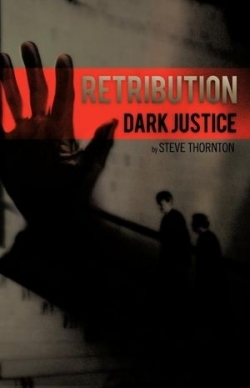Retribution
Dark Justice
It’s not unusual to want to exact vengeance on someone who has wronged us. The desire to bring vigilante justice to criminals who get away with crimes is especially universal, kept in check by a general sense of propriety—and likelihood of legal consequences.
In Steve Thornton’s gripping debut thriller-mystery, Retribution: Dark Justice, someone is killing the felons who get off scot-free. Police officers David Felton and John Blanchard, frustrated by loopholes in the legal system themselves, are tasked with bringing this shadowy figure to justice. As Felton and Blanchard investigate, they grapple with the nature of crime and punishment, as well as what to do about this dark avenger.
Thornton weaves a splendidly taut page turner that exudes a chilling air of menace, while simultaneously delivering deserved criticism of the criminal justice process. He also asks readers to consider if letting criminals off on technicalities is worse than murdering felons vigilante-style. He wonders what alternatives exist when the system fails. Thornton integrates his views into compelling characters and a suspenseful plot, skillfully avoiding the appearance of badgering the audience with his message.
Additionally, Blanchard, Felton, and the unknown vigilante represent multi-faceted, relatable characters. In the case of the unknown avenger, it is a masterstroke that Thornton can make spectators comprehend this twisted individual’s motivations, even as readers shudder at the villain’s actions. The author even develops the avenger’s victims enough so readers feel empathy for the murderers and rapists who meet their demise at the hands of this outlaw. Secondary characters are also portrayed with depth.
The novel’s plot is just as twisted as the vigilante’s mind. Events snowball fast and furious, with each scene offering new and unexpected revelations. Whether he’s adding a new dimension to the evildoer’s torture techniques, ratcheting up the political consequences for Felton and Blanchard, or adding yet another layer, Thornton’s surprises keep readers astonished until the very last page. The internal conflicts experienced by Felton and Blanchard, who simultaneously appreciate the villain even as they pursue him, add another potent dimension.
The novel’s flaws do not hamper overall enjoyment of the book, but they are worth mentioning. They include characters who, while developed, exist only to be the villain’s victims. A few scenes rely too much on convenience. On a more textual level, inconsistent punctuation and capitalization, along with a few missing periods, are distracting.
Nonetheless, avid mystery or thriller readers should fear no retribution from this generally stellar first novel.
Reviewed by
Jill Allen
Disclosure: This article is not an endorsement, but a review. The publisher of this book provided free copies of the book and paid a small fee to have their book reviewed by a professional reviewer. Foreword Reviews and Clarion Reviews make no guarantee that the publisher will receive a positive review. Foreword Magazine, Inc. is disclosing this in accordance with the Federal Trade Commission’s 16 CFR, Part 255.

